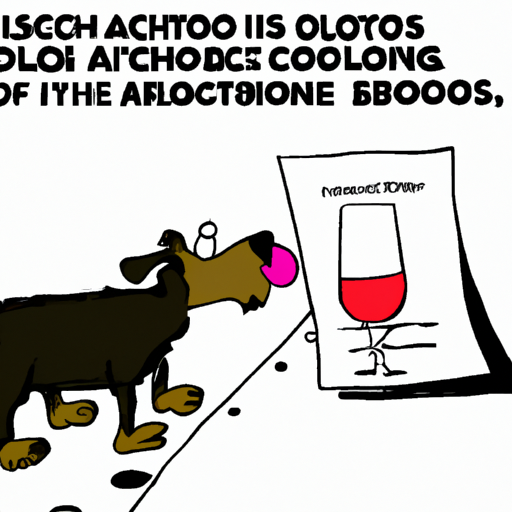Introduction
You, as a caregiver, have probably wondered, “What happens when dogs drink alcohol?” It’s a natural question to ask, given the curious nature of our furry companions. You may have even seen videos or images online of dogs drinking beer or wine, leading you to ponder the effects. This article aims to provide you with comprehensive information on the subject, so you can make informed decisions about your pet’s health.
The Physiological Impact of Alcohol on Dogs
Firstly, it’s important to understand that dogs are far more susceptible to alcohol than humans are. Their smaller bodies and different metabolism mean even a small amount of alcohol can have severe effects.
- Central Nervous System Damage: Just like in humans, alcohol depresses the dog’s central nervous system. This can lead to behavioral changes, slower reflexes, and poor motor control.
- Respiratory Problems: Large amounts of alcohol can depress your dog’s respiratory system, causing difficulty breathing and potentially leading to a respiratory crisis.
- Liver and Kidney Damage: These organs are responsible for filtering toxins, including alcohol, from the body. Over time, alcohol can cause significant damage, leading to serious health problems.
To put it into perspective, consider this table:
| Dog’s Weight | Approximate Amount of Alcohol to Cause Symptoms |
|---|---|
| 10 lbs | 1 oz (30 ml) |
| 20 lbs | 2 oz (60 ml) |
| 30 lbs | 3 oz (90 ml) |
The Behavioral Impact of Alcohol on Dogs
Apart from the physical effects, alcohol can also lead to significant behavioral changes in dogs.
- Aggression: Dogs under the influence of alcohol may become aggressive or overly defensive, which can be dangerous for both the pet and the people around them.
- Depression: Alcohol can depress a dog’s mood, causing them to become lethargic and unresponsive.
- Anxiety: The altered state of consciousness that alcohol induces can create anxiety in dogs, leading to restlessness and destructive behavior.
Preventing Alcohol Consumption in Dogs
As a caregiver, your role is pivotal in preventing your dog from consuming alcohol. Here are some steps you can take:
- Keep alcohol out of reach: The easiest way to prevent your dog from consuming alcohol is to keep it out of their reach.
- Educate others: Ensure that everyone in your household understands the dangers of alcohol to dogs.
- Provide dog-friendly treats: Instead of alcohol, consider dog-friendly treats or toys that can keep your pet happy and occupied.
Frequently Asked Questions (FAQs)
Q: Can dogs have a small amount of alcohol?
A: No, even a small amount of alcohol can be harmful to dogs.
Q: What should I do if my dog has consumed alcohol?
A: If your dog has consumed alcohol, take them to a vet immediately.
Q: Are there any safe alternatives to alcohol for dogs?
A: Yes, there are many dog-friendly treats and toys available that can provide a safe and enjoyable alternative to alcohol.
Q: Can alcohol be used for medical purposes in dogs?
A: No, alcohol should not be used for medical purposes in dogs without veterinary advice.
To conclude, it’s essential to remember that while we may enjoy a glass of wine or a cold beer, these beverages are not suitable for our furry friends. As a caregiver, your role is to create a safe and healthy environment for your pet. Be aware, be knowledgeable, and most importantly, be a responsible pet parent.



